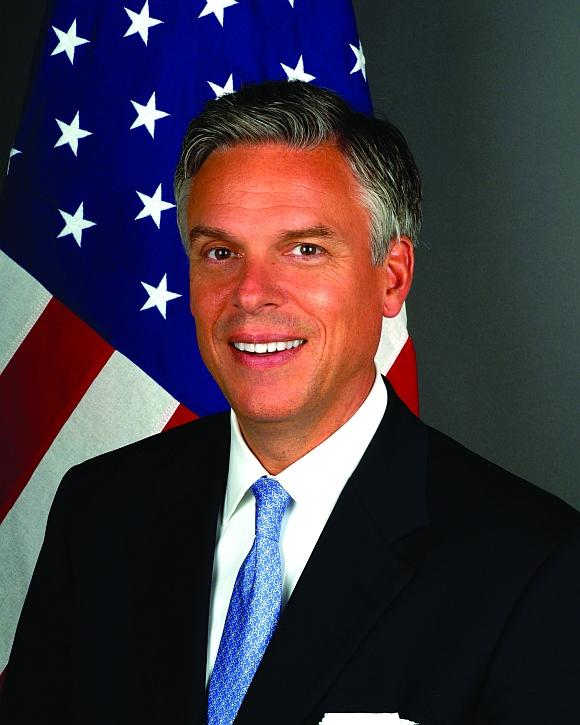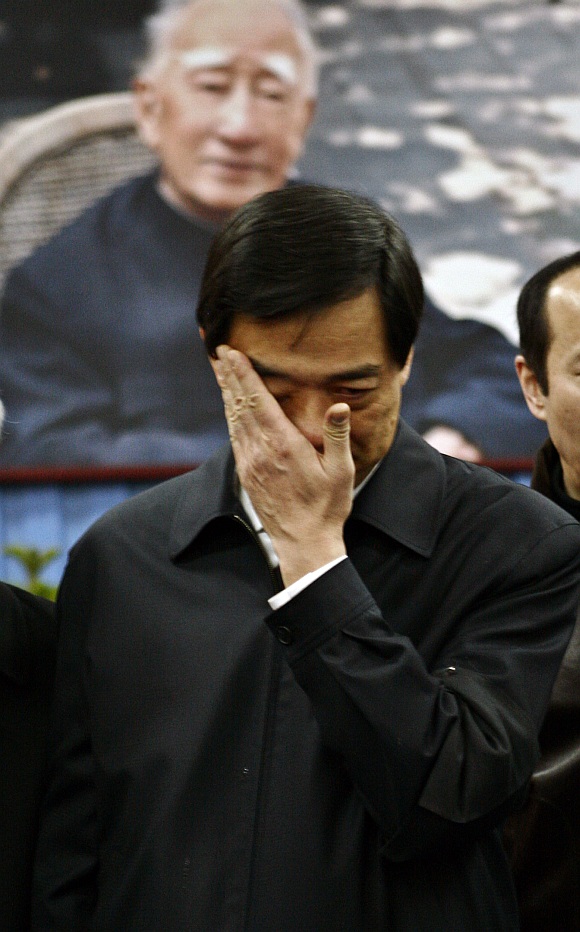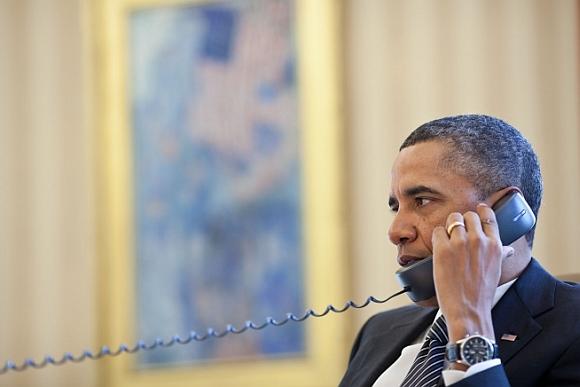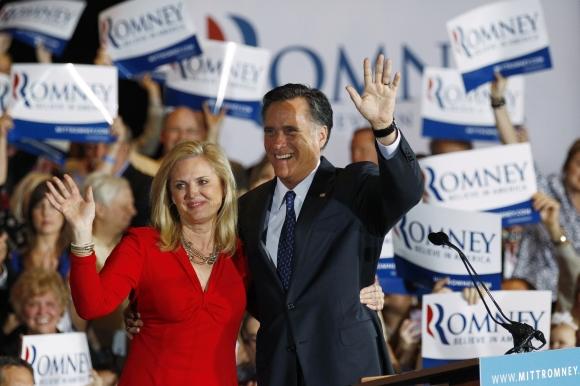 | « Back to article | Print this article |
'India has ALREADY arrived'
Jon M Huntsman, the cerebral Republican leader discusses Beijing, the November elections, and more, in a conversation with Aziz Haniffa
When President Barack Obama appointed two-term Republican Utah governor Jon M Huntsman as the ambassador to China in 2009, it was more than a rumour it was a strategic move to get a potential -- and highly cerebral -- opponent out of the way from his re-election bid in November 2012.
After returning to the US -- he served in Beijing until April 30, 2011 -- Huntsman did run for the GOP nomination, but just couldn't get any traction in a polarised party that had veered to the extreme right.
After a poor showing in New Hampshire, he withdrew from the race. But there is no denying he is probably one of the most experienced politicians in the business today, not to mention his foreign policy expertise, especially when it comes to China but also India, which he has visited multiple times, including leading a state trade delegation in 2007.
What are your views today in terms of New Delhi as a global player, considering that India and China are dubbed as the emerging powers?
I've followed India's trajectory for almost 30 years, since my first visit. And, the world is awakening to the fact that the order of things, economically, and in terms of traditional global power, is changing.
Certainly, the US maintains 25 per cent of the world's GDP, China is second. But everybody knows that India will be a significant player and has come leaps and bounds in recent years. And credit to policymaking in India, and a credit to leadership and a credit to India's increasing commitment to free markets based on democracy.
I see nothing but blue skies ahead for India's development, now already putting in solid economic growth rates of seven and eight per cent. So, the world is paying more and more attention to the new contours, which certainly include China and India, and our commercial plans, our foreign policy, our national security strategies, will all have to be based and built upon that new global reality.
President Obama has said that India is no longer an emerging power, but an emerged power. Do you concur?
It depends on what data you base that on. In terms of per capita numbers, you would have to say that India is in the rapidly developing category. In terms of prestige and clout on the world stage and India's ability to influence world events, I would agree with what the President has said -- India has already arrived.
But it also has almost 400 million of its people living in abject poverty.
That's correct. And that's why I say when you look at the per capita numbers, you have to look at it slightly differently. But you can address economic development and international economic opportunities by being a global player -- by attracting more investment, by expanding your trading opportunities. That's how you bring more in the way of opportunity and better lives to the world's poor.
I would have to argue that India is very well positioned in the years to come to be able to expand its economic base based upon its clout in the world -- to bring in more investment, to offer more in the way of opportunities because India is the centre of innovation.
It's the centre of ideas, innovation and entrepreneurship increasingly. And, yes, you have a very large percentage of its population that is poor, but the only way to move beyond that is through economic expansion.
Don't you think President Obama should use his bully pulpit to push for India as a permanent United Nations Security Council member, instead of saying that it can only happen with the reform of the Security Council and that a US push for a permanent seat for India are dependent on these reforms?
In my foreign policy speech, when I declared as a candidate for president, I called for a much closer US engagement with India -- military to military and economically. I also called for strong US support for a UN Security Council seat (for India) that isn't by word alone, but I believe by deed. The Security Council ought to be more of a direct reflection of the evolving world in which we live.
Click NEXT to read further...
'China's challenges are unique and different'
There is always the constant comparison of the authoritarian China and the democratic India. But with China's economy and growth, can India even be compared to China in terms of being a significant global player and having the kind of impact Beijing has had in this emerging world order and is certainly expected to have going forward?
You have to look into differences in the two models and they are quite different. China's challenges are quite unique and different. Their greatest challenge and concern are within their own population as to the prospects for domestic instability.
With the rise of the social-network generation and 500 million connected to the internet and 90 million bloggers who are blogging messages that would have landed anyone in prison a few short years ago, this is among the most prominent concerns in China these days.
How do you deal with the speed with which technology is developing and is placed in the hands of ordinary citizens?
India doesn't need to face this problem. It is an open, vibrant, transparent democracy. It's a participatory democracy. True, you have other elements of concern and other vulnerabilities, but they are not based on the same basic concern that China has with its domestic population.
So, given India's commitment to open markets increasingly given the success of India's diaspora, well known and famous throughout the world, I would have to say that the India model has sustenance. I believe it has longevity.
Although both Washington and Delhi have strongly denied such a containment policy or encirclement of China, the recent envisaged trilateral agreements between the US-India-Japan, US-India-Australia and the US and India's close cooperation with the East Asian States can lead to some expected paranoia in Beijing. What is your take?
My take on this is that you generally create alliances with those nations that are like-minded and that share your values. With India we have not only a relationship shared on interests, but we have a relationship shared on values.
If you want permanence in a relationship, durability, you need shared values.
On our relationship with China -- now 40 years old this last month -- is certainly based on shared interests. The challenge going forward will be whether we are able to make it a relationship based on shared values.
So, in the Asia-Pacific region, our alliances naturally are going to take us to like-minded countries, those that believe in the dignity of the individual, open markets, human rights, liberty and democracy.
Some might call that containment, as I know many do in China. I call it reaching out and expanding your network of like-minded countries, who naturally form alliances for the purposes of enhancing trade, economic prosperity and security, and I believe that policy should and will continue despite some of Beijing's paranoia about the idea that they are somewhat hemmed in by it.
Do you believe Iran can be a damper on US-India relations?
I believe it will be a very significant point of discussion, as it should be. Again, we get back to the whole conversation of shared values. And those shared values take on more of a global dimension sometimes.
I also believe that it gets to the heart and soul of India's emergence on to the world stage and the sense of responsibility that goes with that. It logically means that the US and India will be paired up more and more, not just on traditional bilateral issues on trade and investment, and security and cultural and education, but rather on some thorny global issues.
Sometimes we'll agree, sometimes we'll disagree, but it speaks to the rise of India more than anything else -- the fact that we are even having this conversation. But I do believe that Iran is a terribly destabilising presence in the Middle East -- their threats towards Israel specifically, their support for terrorist networks through Syria, Hamas, Hezbollah.
To address this properly, it can't always be done unilaterally, it must be done multilaterally. And that will require the help of India. If India weren't as prominent as it was on the world stage, we wouldn't even be having this conversation about India playing a role with regard to Iran.
Click NEXT to read further...
'Bo Xilai incident is an example of how politics plays out in China'
Do you believe that (Chinese Vice President) Xi Jinping and the hardliners in Beijing will compel a change in foreign policy, given that Xi's biggest allies are in the People's Liberation Army?
I believe that Xi Jinping, first of all, has done a very successful job in winning over the power centres of political influence in China, which is never an easy thing to do.
He's been able to strike up a relationship with the PLA that is decades old, going back to when he served as an assistant to the former defense minister in the early 1980s. He's been successful in cultivating the party cadre and he's also been successful in cultivating the princeling population.
From here on, it will be a function of Xi Jinping's consolidating his power base, which will take a little bit of time. He'll be installed in power in October and from there it will take probably six months for him to successfully consolidate his power base and to vet his own priorities.
I believe he will have three or more very good years of relationship-building with the outside world that could very well be within his grasp, depending upon how he wants to pull the levers of power. But the evidence is already there that he will have a more solid footing with the PLA than did his predecessor and that will be an important part of strategic stability, regional stability.
In the last couple of years, there's been a not altogether healthy disconnect between civilian leadership and the military leadership in China. Xi Jinping's in a position to be able to iron out some of those differences.
What do you make of the Bo Xilai (sacked by the Communist Party because of his alleged scheme to remove his police chief and impede a corruption investigation involving his family) controversy? Do you think the transition of power that you talked about will be amenable to all of the factions and powers that be in China, particularly to the old guard?
Again, the Bo Xilai incident is an example of the way in which politics plays out in China. Politics are local, whether in the United States, India or China, and in all cases, they can be pretty vicious, and clearly we are seeing positioning going on for the highest bodies in China.
When you stop to think that in October probably 70 per cent of the top 200 leaders will be turning over, this is probably the most significant and comprehensive leadership transition since 1949.
Seven of the nine members of the Standing Committee of the politbureau -- the senior board of directors, if you will -- will be turning over and the rise of the first generation.
So the stakes are extremely high and what we are seeing play out is a manifestation of politics at the localest of all levels as the final decisions are being made in Beijing.
Click NEXT to read further...
'Wait and see how approaches change after November'
Isn't Mitt Romney right in that Obama has jumped on the anti-China bandwagon after vacillating earlier and not taking actions on issues like China's manipulation of its currency?
You have to wait and see how the statements change -- or the approaches change -- after November. You had Bill Clinton who talked about the 'butchers of Beijing' before his election. You had Ronald Reagan's comments withdrawing our diplomatic relationship with Beijing and re-recognising Taipei, which of course, shifted even under Jimmy Carter.
Once they got in office, the rhetoric changed and the outreach changed because the reality was such that you needed to coexist.
You needed to find some ways to cooperate in order to solve not just bilateral issues, but increasingly regional and global issues as well.
I would be hesitant first of all to take any statements on China too seriously during an election year -- it's typically not a reflection of what will take place after November.
Though you endorsed Romney when you withdrew from the race, you have not had the most congenial relationship with your fellow Mormon. Do you still strongly endorse him?
I didn't ask for anything. Typically candidates, when they are getting out of the race, ask for something when they get out. I don't do that. I don't believe in political favours. I would never do anything like that. I haven't asked for anything or it wasn't my intention to ask for anything.
I simply thought he was the best situated as I still do to deliver on a strong economy, which we desperately need in the US.
People have made too much of our relationship. The fact of the matter is, I don't know him well and he doesn't know me well. We've briefly overlapped as governors and I didn't know Romney before I was elected (Utah) governor, even though our families knew each other 100 years ago. So, people tend to want to make a little bit more of that than actually is fact-based.
(National security adviser in the Carter administration) Zbigniew Brzezinski has said that as an American he is embarrassed by the current crop of Republican candidates. Do you share that view, or do you subscribe to the contention by all of them that any one of them would be better than President Obama?
Based on the prevailing needs of our nation right now, which are fundamentally based on tax policy, regulatory policy, energy independence more than anything else, I would have to say that the Republicans are better suited in terms of their policy commitments to getting done what must be done in order to shock this nation into a higher sense of confidence.
Because we have both a crisis of confidence, but we also have some very real structural barriers that stand in the way of our creative class taking off once again.
We will be stalled until they have confidence in their direction and into their future, and I believe that Republicans, as governors but also during the campaign, have expressed the kind of policies that would do what needs to be done to get the US moving again.
Could someone like (former US senator from Pennsylvania) Rick Santorum, with his extreme right social conservatism, be an acceptable GOP nominee for president? What do you think he is playing for? Can he hurt the party?
I don't know if he's the most electable candidate. He's a good man. I like him and he's a friend. He appeals very strongly to one end of the Republican Party, but if you do the math, you will soon find that in order to win an election, any Republican is going to have to be successful in winning over a big chunk of the independents.
The fastest-growing party in America today is the unaffiliated party and that suggests that either a Democrat or a Republican able to gain a winning strategy will include some level of outreach and a message that the independents find appealing. That ultimately allows you to bring them over. Or, you won't win the election.
Click NEXT to read further...
'Shared values are what will hold India and the US together'
Do you fear that it could be a brokered convention in Tampa, Florida?
I don't think it will be a brokered convention. I know there's some talk of that. It's mostly fantasy talk as far as I am concerned. I believe Mitt Romney will have enough in the way of delegates to have the nomination wrapped up.
But what he'll have to focus is the level of enthusiasm, once he gets to the convention and then beyond that, what to do about the independent vote. But you got to take each one a step at a time.
The Republican candidates' anti-immigrant fervour has disturbed many minorities, particularly the Hispanics and Asian Americans. Won't this cost the GOP the November election?
We must be able to talk about the immigration issue in ways that don't scare people. Recent elections would suggest that we have not found the right kind of language with which to deal with the immigration issue.
But if you look at the numbers, I like to remind people that we don't have the immigration problem now that we did several years ago. People aren't just coming across the border -- because there aren't jobs. In fact, we are now running at a 40-year-low in terms of immigration. So, we need to face the facts.
We need to deal with the reality that it isn't the issue that it has been in years past. The policy question will be: How do you deal with those who are here in the United States? And, how do you deal with those who are here in the US in ways that don't send negative signals to every other immigrant community, whether the Indian-American community or the Asian-American community?
I've had my friends tell me that they've heard the discussion on immigration directed mostly toward those coming in from Mexico, but the message is the same to their ears -- and that is being one of anti-immigrant.
When, in fact, our nation has been given life and sustenance and strength from our very beginning because of the infusion of energy and vitality that immigrants bring.
Besides governor, you were deputy US trade representative, trade ambassador, deputy assistant secretary of commerce, ambassador to China, ambassador to Singapore. Not to mention your private sector experience as chairman and CEO of the Huntsman corporation and president and CEO of the Huntsman Cancer Foundation at the University of Utah that donates millions of dollars to cancer research.
You could be an asset to any administration in promoting trade relations with any country or countries and political and diplomatic ties.
If the Republicans capture the White House, would you like to have a cabinet portfolio?
I've had the best job in government. I have been a governor twice-elected. I've been an ambassador in what I believe to be the most sensitive and challenging relationship we have in the world right now (with China). I can't think of too many things that would be better than what I've already done. But I will always be willing, ready and able to serve my country if there is reason to do so.
How about ambassador to India?
(Laughs heartily) How I would love that! Simply because I love India and the beautiful culture of India and to say nothing of my Indian daughter, who is fascinated by India and who is longing to visit and I promised her a visit some time soon.
Your fondness for India is almost legendary. You were the first governor in US history to host a Diwali celebration in the governor's mansion. What's your take on both the Indian-American community's progress in Utah and more generally in the US?
They are now also entering the political sphere -- holding two governorships, as well as some of the most senior administration positions. And the second generation is really coming into its own, particularly in terms of public service.
It's a wonderful success story and everywhere I go, in every facet of life -- whether it is business, whether it is education, whether it is politics -- I run into Indian Americans, who are among the most capable human beings I've every met.
Not only capable in an innate sense, but also having been brought up either partially in India and partially here in the US or here in the US of Indian parents, with what I mentioned earlier, that is, the all-important shared values.
I believe that's the cement, that's the glue that will inherently hold the Indian and the American people together for as far as the eye can see. And it makes for a very, very hospitable environment naturally for Indian Americans in the US.
TOP photo features of the week
Click on MORE to see another set of PHOTO features...





